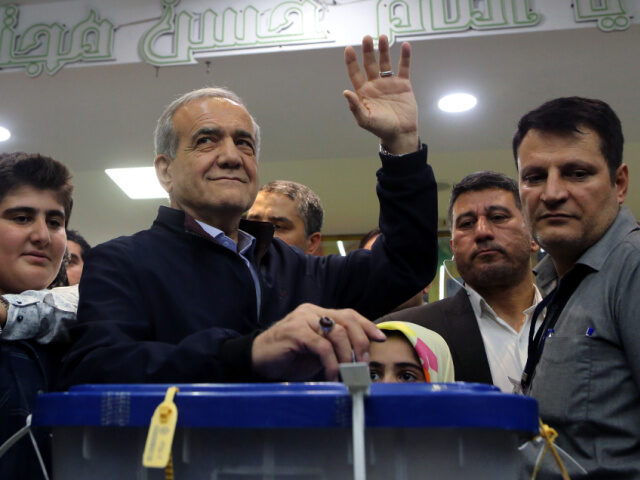Iran’s “moderate” reformist candidate Masoud Pezeshkian, once dismissed as a dark horse with little chance of winning the emergency election to replace the late President Ebrahim Raisi, managed to become the frontrunner by about a million votes when the results were announced on Saturday. Pezeshkian could not get past the 50 percent threshold to win outright, so he will face hardliner Saeed Jalili in a runoff election on July 5.
Pezeshkian collected 42.4 percent of the vote, or about 10.4 million votes, in the low-turnout election. Jalili came in second with 38.6 percent or 9.4 million votes. Another hardliner and the early favorite to win the election, parliamentary speaker Mohammed Bagher Qalibaf, placed third with just 13.8 percent.
Turnout was estimated at just 40 percent of Iranian voters, a record low. Many Iranians do not bother to vote because the elections are rigged in advance by a theocratic Guardian Council, and even if a “moderate” like Pezeshkian wins, his ability to actually reform the Iranian system would be minimal. The autocratic ruler of the country will remain Supreme Leader Ayatollah Ali Khamenei, who is aging and in poor health, so he could be replaced soon.
Human rights activists, both within Iran and internationally, urged Iranians to boycott the election to replace Raisi, who was killed in a helicopter crash in May. The Iranian regime complained that the U.S. government was “meddling” in the election and depressing turnout by criticizing the vote as a farce.
Raisi won his election in 2021 with 18 million votes, which was almost as much as the two front-runners in Friday’s contest combined, and turnout for Raisi’s election was considered a record low at the time. Critics of the regime believed it only allowed Pezeshkian to run against five hardliners to create the illusion of a real choice and were taken aback that he polled as well as he did.
Pezeshkian campaigned on skepticism of Iran’s strict laws for women’s head coverings and on the need to develop better relations with Western nations to secure Iran’s economic future. Jalili offered some criticisms of Raisi’s economic policies, which left Iran in dire shape, but he is a rigid theocrat who is deeply hostile to the West.
The UK Guardian on Saturday found Iranians deeply skeptical of regime media’s breathless coverage of an exciting election:
One Tehran citizen, Kianoosh Sanjari, struck by the contrast between the official TV reports of excitement at the polls and what he had seen on the streets of the capital, said he travelled to 14 polling booths and did not find more than five people queueing to vote. He said he then went to Laleh (Tulip) Park, one of his favourite haunts in Tehran, and found old men playing chess under a gazebo, crowds of youngsters playing badminton football and volleyball, and children practising slacklining.
“I don’t know about the situation in other cities, but I can definitely say that the absolute majority of people in Tehran ignored the presidential appointments of the Islamic Republic of Iran and did not participate in them.”
Reform activist Abbas Akhoundi doubted the turnout would be much better for the July 5 runoff, even though the reformist Pezeshkian seems to stand a good chance of winning.
“A large part of Iranian society does not see a place for itself in the ruling political institutions. Therefore, they had the right not to participate in the elections. The government should know that, if this procedure continues, this part of society will get bigger because even some of those who voted agree with this group,” Akhoundi said.
RELATED — Sec. Blinken Defends Condolences for Iranian President Raisi: “Normal Course of Business”
Video Source: C-SPAN
COMMENTS
Please let us know if you're having issues with commenting.